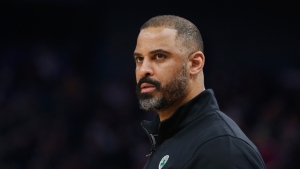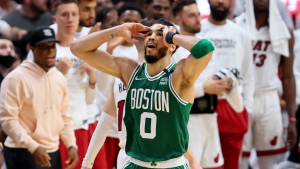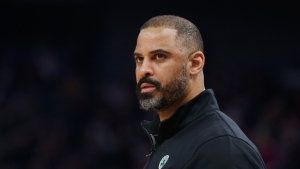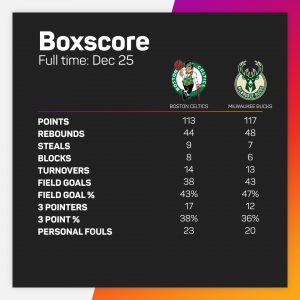There will be plenty to play for when the Boston Celtics arrive at Fiserv Forum to take on the Milwaukee Bucks on Thursday.
Heading into the game, the Celtics (50-30) occupy the Eastern Conference two seed, while the Bucks (49-30) are a half-game back in third, holding the tie-breaker over the Philadelphia 76ers (49-30) in fourth.
Since the All-Star break, no team has a better winning percentage than the Celtics (16-4), while Milwaukee are fifth over that period (13-6); but while the reigning champion Bucks find their feet, Boston have gone to a new level.
For the season, the Celtics are number one in defensive efficiency, as new head coach Ime Udoka's switching system has maximised the physical gifts of defensive stalwarts Marcus Smart and Robert Williams III.
At this point, Boston's defense is a given, but post-All-Star break, they have also had the number one offense in the league, and are putting a gap on the rest of the field. Over that time period, the closest team to Boston's 122.2 points per 100 possessions have been the Minnesota Timberwolves, 2.7 points per 100 possessions behind at 119.5.
For context, that 2.7-point gap is greater than the 2.6-point margin between the Timberwolves and the 11th-placed 76ers (116.9) for the same period, and Boston's 12.9 net-rating since All-Star weekend is a number generally reserved for some of the greatest regular season teams in league history.
However, the team right behind the Timberwolves on the list, in third place, are the Bucks, and it is no hot streak as they boast the fifth-best offensive efficiency over the whole year.
These teams are both serious contenders to represent the Eastern Conference in the NBA Finals – but they go about it in very different ways.
Primarily, that has a lot to do with the Celtics' switching defensive system.
The Celtics 'switch' screens – meaning instead of fighting over or under the screening player to recover back to your assignment, the player guarding the screener takes on the assignment of guarding the ball-handler, while the ball-handler's defender takes responsibility for the screener and his next movements.
The Bucks, on the other hand, play 'drop coverage', which means their on-ball defender tries to force the ball-handler on a predictable path around the screen, while the screener's defender peels off into a help position, with the aim of forcing the ball-handler to pull up for a mid-range shot with their defender contesting from behind.
Both systems are formed on sound logic. In switching schemes, the idea is to eliminate as much dribble penetration as possible by keeping the ball-handler in front on the perimeter, while trusting the smaller guard to be able to deny the screener an easy catch in the paint.
Drop coverage, on the other hand, forces teams to consistently attempt mid-range jump shots, which are statistically the least valuable shot in the game.
In theory, Boston's switching defense should perform well against Giannis Antetokounmpo, as the Bucks' two-time MVP thrives at attacking the rim, while Milwaukee should be able to bait Jayson Tatum and Jaylen Brown into mid-range jump shots that can go cold for extended stretches.
But the numbers show it may not be that simple.
Boston allow the second-fewest amount of points in the paint per game, and while Antetokounmpo lives at the rim, the Bucks actually come in last in the league with their percentage of points scored in the paint.
While that may indicate that the Celtics' defense is playing right into how the Bucks like to play, Boston also allow the second-lowest three-point percentage in the league.
It poses an interesting question about Boston – is their defense truly so good that teams can not score inside the key or from long range, or is their defense the top-ranked in the league because their opponents just keep missing threes?
Opposing three-point percentage can be a messy stat due to general shooting luck, and Boston allow opponents to get up a league-average amount of attempts, so if they are due for some regression to the mean, it means they are due to be on the wrong end of some hot shooting nights.
Boston's defense also allows the lowest amount of opposition assists per game, but Milwaukee are third-last in assist percentage, so how much are the Bucks actually trying to do the things the Celtics are built to stop?
Milwaukee play at the fifth-highest pace in the league, while Boston play at the fifth-lowest – all signs point to the fact that something has to give, and whoever can play the game at their tempo may just hold the keys.
PIVOTAL PERFORMERS
Boston Celtics – Marcus Smart
Marcus Smart is not the best scorer on the Celtics, or the best ball-handler, but he excels in the areas that have made this Boston team great during the second half of this season.
He is the bookmakers' favourite to win Defensive Player of the Year due to his ability to switch off of point guards and bang bodies down low against the bigs, unlocking the true upside of a switching system as post players regularly fail to take advantage of their significant height advantage.
The Bucks are a big team, so for the Celtics defense to rise to the occasion once again against a true contender, Smart will need to hang with Jrue Holiday on the perimeter, as well as keep Antetokounmpo out of the lane.
Milwaukee Bucks – Brook Lopez
Antetokounmpo is Milwaukee's best and most valuable player. However, the centrepiece of the Bucks' drop coverage is Brook Lopez.
Lopez will be the biggest player, with the longest arms, for either team, and Milwaukee's entire defensive scheme will revolve around forcing players to take and make shots over his outstretched arms.
He also has the size, and the underrated post game, to make life miserable for whichever undersized guard gets caught in screening actions and needs to switch onto the seven-footer.
Smart will be able to hold up if he establishes good early position, but if the Bucks can get Derrick White or Payton Pritchard involved in the switch, it could be a long night inside for Boston's defense.
KEY BATTLES – Who can get the most 'easy' points?
In a game that will likely resemble a playoff atmosphere, the winning team may simply be the side who make life easiest on themselves.
Fast-break points and free throws limit the amount of possessions a team needs to grind their way through a set half-court defense, and provide the easiest avenues to uncontested points.
Milwaukee rank as the eighth-best team at getting to the free-throw line, and fourth-best at denying their opposition free throws, while Boston are 21st at getting to the line.
As mentioned, Boston like to play at a methodical pace, ranking 20th in fast-break points, while Milwaukee have the fifth-best transition defense in the league.
HEAD-TO-HEAD
These two sides have met three times this season – all before the All-Star break.
Boston won the first two home fixtures – including an overtime win where Dennis Schroeder scored a game-high 38 points, before being traded to the Houston Rockets – while Milwaukee won the last meeting, and the only one at Fiserv Forum, 117-113.
































